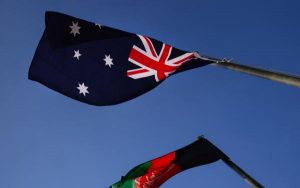Twenty-five leading Afghan and Australian human rights organizations have published an open letter today urging the Australian government to make public a long-awaited inquiry by the Inspector-General of the Australian Defense Force into alleged war crimes committed by Australian special forces in Afghanistan.
The inquiry, four years in the making, comes amid a volley of investigations by Australian media outlets into the alleged war crimes and the “culture of impunity” that enables such violations.
To date, investigations mainly by the Australian Broadcasting Corporation (ABC) and The Age newspaper in Melbourne have found that dozens of unarmed alleged Taliban fighters, as well as civilians, including children, have been killed by Australian forces in the last decade.
The Afghan Files, published in 2017, laid much of the foundation for subsequent reporting. The Afghan Files, made up of hundreds of pages of secret defense force documents leaked to the ABC, detailed a “culture of impunity,” in which Australian soldiers killed Afghan civilians and severed the hands of Taliban fighters killed in action.
Just last week the ABC reported that an Australian special forces soldier made a “deliberate decision to break the rules of war” by executing a prisoner after being told that there wasn’t enough room on a U.S. aircraft for all seven of them.
“The pilot said, ‘That’s too many people, we can’t carry that many passengers.’ And you just heard this silence and then we heard a pop. And then they said, ‘Ok, we have six prisoners,’” a U.S. marine present at the time said.
Earlier this year, the ABC obtained footage from a helmet camera that showed an Australia Special Air Service (SAS) operator chase down and “execute” an unarmed Afghan civilian as he lay on his back in a field.
Former defense chief Admiral Chris Barrie told the ABC that he was shocked by the footage.
“The man was not armed, the man was in a docile situation, and he was shot,” Barrie said. “Now, in a situation where you have armed forces which are carrying out tasks, in another place, under appropriate rules of engagement and the laws of armed conflict, this is a war crime.”
The Australian Defense Force investigated the incident but ruled that the killing was justified, stating it was in self-defense. The special service soldier found to have cut the hands off dead Taliban fighters was also cleared.
In another incident, the ABC reported a “mass shooting” in which Australian special forces killed up to 10 unarmed Afghan civilians during a 2012 raid.
The Australian Department of Defense, NATO, and others have been accused of covering up or not reporting incidents.
In 2010, a crowd of around 600 Afghan demonstrators threw rocks at an Australian base in Uruzgan province. At the time, NATO reported that one protester was killed when he “aimed an AK-47” at troops inside the base, but a report by the Afghanistan Independent Human Rights Commission found that five civilians had been killed and six others wounded.
Reports have also emerged of Australian forces allegedly planting weapons on the bodies of Afghan civilians. In one incident, the ABC found that the same AK-47 assault rifle was planted on two different bodies.
Australian troops largely withdrew from Afghanistan in 2006 and 2007. A small task force consisting of Australia’s special forces remained, mostly to train Afghan troops but also to assist Afghan special forces on Taliban raids.
A confidential 2016 report commissioned by then-chief of army Angus Campbell found that Australian special forces soldiers were fuelled by “blood lust” when they tortured and executed prisoners in Afghanistan and then covered up their actions, The Age newspaper reported earlier this week.
The 2016 report is expected to form the basis of the long-awaited and highly secretive inquiry into war crimes by Major General Paul Brereton, head of the Inspector-General of the Australian Defense Force – the same inquiry Australian and Afghan human rights organizations have urged be made public.
Earlier this year, the inspector-general’s annual report revealed that there were as many as 55 separate incidents or issues under investigation, “predominantly unlawful killings of persons who were non-combatants or were no longer combatants, but also cruel treatment of such persons.”
Ahead of the inquiry’s release, planned for later this year, the Australian army is facing a cultural and ethical overhaul.
The selection courses for Australia’s two special forces units are expected to be combined from next year in a move Defense claims is aimed at improving “efficiency.” Defense insiders, however, told the ABC that the initiative is instead aimed at helping break down the “tribal” and “isolated” culture within the SAS and that even more radical ideas such as disbanding or rebranding the SAS have been discussed.
Army commander Lieutenant General Rick Burr wrote to all Australian soldiers earlier this month explaining why the investigation was launched and told them to prepare for serious findings.
“We’re holding ourselves to account,” he told The Strategist. “We asked for this inquiry when we became aware of rumors around these matters.”
Australian Defense Minister Linda Reynolds, in an interview for the Australian Strategic Policy Institute’s “Strategic Vision 2020” conference, warned that Australians will be dismayed by the findings of the investigation into war crimes committed by Australia’s special forces, saying that the report has neared its conclusion.
“I can say that in the intervening years, the army and particularly our special forces have been doing a significant amount of self-reflection on how some of these reported circumstances could have happened and what needs to happen structurally and culturally to make sure that these events do not happen again,” she said.

































